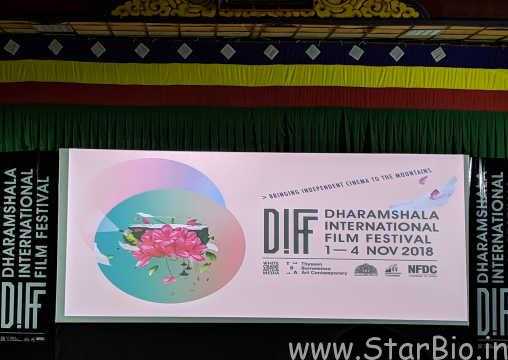Amidst children frolicking around school grounds and a venue overlooking snowy mountain peaks, the 7th edition of the Dharamshala International Film Festival (DIFF) came to an exhilarating close on Sunday, 8 October.
While the selection of films eventually turned out to be disappointing — further weakened by the dropping of the opening and closing films in the aftermath of the #MeToo movement — there was more than enough for everyone to have a grand time.
The Tibetan Children’s Village has only gotten better with every year ever since the venue for DIFF shifted there. While last year was bright and sunny with clear skies for the duration of the four-day festival, this years festival attendees were greeted with unseasonal rains.
The rains though, were never a deterrent, as people just huddled up under the podium listening to music, passing around plates of vegan meat and puffs of cigarettes. One fellow hostel guest wouldn’t stop thanking me once I told her about the festival and how to get there, despite getting soaked multiple times.
DIFF, organised by filmmakers Ritu Sarin and Tenzing Sonam, is aware of its location more than any other film festival in the country. Their choice of films, year after year, have focused on the local, the conflicts and more recently, on migration. Short films are always a large part of the festival, with many of the directors present for informal chats. The festival also takes us on a journey around Asia, showcasing films that wouldn’t be playing at bigger festivals such as the Jio MAMI Mumbai Film Festival or the International Film Festival of India and brings filmmakers closer to patrons.
Cinema is used as a backdrop for the stunning venue that greets visitors year-after-year. Life goes on for their children and teachers, just as many locals, tourists and cinema aficionados throng the venue to catch a movie or simply bask in the atmosphere.
Picture Time, an inflated pop-up theatre, was new at DIFF this year. Instead of tying up with PVR Cinemas, as they had done last year, Sarin and Sonam knew they wanted something that was more personal and accessible for everyone. Picture Time is a small and intimate venue with those at the front getting mattresses, pillows and blankets, conveniently located on the basketball court. The only problem is the fact that the theatre isn’t waterproof.
A fellow journalist, on the first full day of films, wanted to watch the documentary, 48 Years: Silent Dictator. It’s a movie about a Japanese man wrongly accused of mass murder, spending 48 years of his life in prison. As he entered the theatre, the only seats left were on the ground. Realising it was way too wet and that there was no provisions for a flooded theatre, he unhappily walked out.
During my time at DIFF, I managed to catch 9 films, one shorts package and a discussion on the #MeToo movement. Amongst those were Ridham Janve’s The Gold-Laden Sheep and the Sacred Mountain, a Gaddi film that ties shepherding, legends and a plane crash with stunning visuals of the Himalayas. Then there was Anamika Haksar’s Ghode Ko Jalebi Khilane Jaa Riya Hoon that takes the dreams of the Old Delhi people and dives into the by-lanes of the walled city, frequented by few.
Another film I really liked was the short film Tungrus from filmmaker Rishi Chandan. It’s a funny and heartfelt tale about a family living in the suburbs of Mumbai and the rooster their father has adopted.
Most films held promise but eventually didn’t hold, and everyone was of the opinion that the festival lineup was disappointing. Philippino film Bamboo Dogs was just one such film. It’s a thriller-cum-road-movie based on the 1995 Kuratang Baleleng massacre in Manila. Some of the directing choices and the dim lighting didn’t really hold with the audience. Another film that seemed good in the synopsis was Dar Gai’s Namdev Bhau: In Search Of Silence. It’s a film that played out more like a National Geography documentary than one with much substance.
It was at the closing night party that I really got a sense at how the festival is run. Sarin and Sonam may be helming it, but without the numerous volunteers, the festival would be nowhere. In fact, the two I talked to gave me contrasting views, “Dissatisfied. It wasn’t what I was expecting. I went from a program manager at another festival to being a glorified security guard at DIFF,” said one young volunteer.
A slightly older woman, a software engineer from the USA who is doing tech for Picture Time said, “I loved it. I absolutely loved. Ritu Sarin couldn’t have been nicer. Only thing I would have liked was to talk to Matthieu Roy, director of The Dispossessed.”
Volunteers, filmmakers, press and special delegates partied the night away in close to freezing temperatures. The opening night and closing night parties, held at the open-air lawn of Hotel Bhagsu give a chance for everyone to open up and have informal chats.
From dancing to rapping and talking about ‘unreleased’ films, DIFF has it all. It’s the festival where one blurs the lines between who is who. Everyone is on the same level and no one is given preferential treatment. Dharamshala International Film Festival keeps on getting bigger, year-after-year, despite the lineup being less than stellar this time around.

